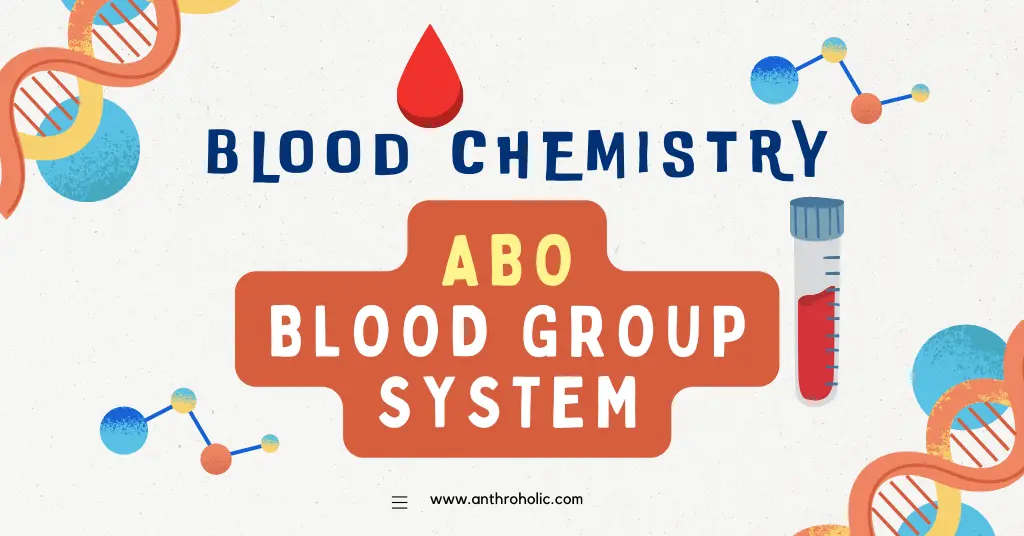AI Answer Evaluation Platform Live Now. Try Free Answer Evaluation Now
Blood Chemistry: ABO Blood Group System
The ABO blood group system, the first and most significant blood classification system known to mankind, has played a critical role in our understanding of blood chemistry, transfusion medicine, and even population genetics.

Historical Background
The ABO blood group system was first discovered by Austrian physician and immunologist Karl Landsteiner in 1901 [4]. Landsteiner’s groundbreaking discovery was driven by the need to understand the reasons behind adverse reactions in blood transfusions and to prevent fatal complications. Over a century later, the ABO blood group system remains a vital tool in transfusion medicine and serves as a foundation for other blood group systems.
Molecular Basis of the ABO Blood Group System
The ABO Blood Group System: Antigens and Antibodies
The ABO blood group system is based on the presence of specific antigens (protein or carbohydrate molecules) on the surface of red blood cells (RBCs) and the corresponding naturally occurring antibodies in the blood plasma. The major antigens in the ABO system are A, B, and H, which determine four primary blood groups: A, B, AB, and O.
| Blood Group | Antigen on RBCs | Antibody in Plasma |
|---|---|---|
| A | A | Anti-B |
| B | B | Anti-A |
| AB | A and B | None |
| O | None | Anti-A and Anti-B |
Genetics of the ABO Blood Group System
The ABO blood group system is determined by the ABO gene, located on chromosome 9 [6]. The gene has three major alleles: A, B, and O. A and B alleles are co-dominant, while O is recessive. The ABO gene encodes an enzyme called glycosyltransferase, responsible for the attachment of sugar molecules to the H antigen, creating A or B antigens.
| Genotype | Phenotype |
|---|---|
| AA or AO | A |
| BB or BO | B |
| AB | AB |
| OO | O |
Clinical Significance
Blood Transfusion Compatibility
Understanding the ABO blood group system is vital for ensuring blood transfusion compatibility. When incompatible blood groups are transfused, the recipient’s antibodies can target and destroy the donor RBCs, resulting in severe or even fatal reactions [8]. The ABO blood group system forms the basis for determining donor-recipient compatibility and has saved countless lives since its discovery.
| Donor | Recipient |
|---|---|
| A | A, AB |
| B | B, AB |
| AB | AB |
| O | A, B, AB, O |
ABO and Disease Associations
The ABO blood group system has been linked to various disease susceptibilities, including cardiovascular disease, cancer, and infectious diseases [2]. For example, research has shown that individuals with blood group A are more susceptible to gastric cancer, while blood group O has a higher risk of peptic ulcers [2]. Moreover, blood group O has been found to be more prone to severe malaria infection [7]. Understanding these associations can inform disease prevention and management strategies for individuals based on their blood group.
ABO Blood Group System in Population Genetics
The distribution of ABO blood groups varies significantly among different populations worldwide. Studying these variations can provide insights into human migration, genetic diversity, and population history [1]. For instance, blood group O is more prevalent in Native Americans and certain African populations, while blood group A is more frequent in Europe and some parts of Asia.
Latest Research on the ABO Blood Group System
Advancements in molecular genetics and immunology have opened new avenues for research into the ABO blood group system. Some recent research findings include:
- ABO Blood Group and COVID-19: Several studies have reported an association between ABO blood group and the susceptibility to and severity of COVID-19 infection [9]. Blood group A has been found to be at a higher risk of severe COVID-19 outcomes, while blood group O appears to be more protected.
- ABO Blood Group and Fertility: Research suggests that ABO blood group incompatibility between partners may be linked to reduced fertility and an increased risk of recurrent miscarriages [3]. Understanding this relationship could help improve fertility treatment strategies and outcomes.
- ABO Blood Group and Cognitive Function: A study conducted by Liumbruno et al. (2020) showed a possible association between ABO blood group and cognitive function, with blood group O individuals exhibiting better cognitive performance. Further research is needed to confirm this finding and elucidate the underlying mechanisms.
Conclusion
The ABO blood group system, with its rich history and continued relevance, remains a cornerstone of transfusion medicine, disease susceptibility research, and population genetics. As our understanding of the molecular basis and clinical significance of the ABO system grows, so does its potential for applications in personalized medicine and public health.
References
[1] Cserti, C. M., & Dzik, W. H. (2007). The ABO blood group system and Plasmodium falciparum malaria. Blood, 110(7), 2250-2258. doi:10.1182/blood-2007-03-077170
[2] Franchini, M., & Liumbruno, G. M. (2013). ABO blood group and neurodegenerative disorders: more than a casual association. Blood Transfusion, 11(2), 184-189. doi:10.2450/2013.0075-12
[3] Kaneko, Y., Kobayashi, J., & Yamamoto, F. (2019). ABO blood group incompatibility lost in the mist of time. Biomolecules, 9(10), 582. doi:10.3390/biom9100582
[4] Landsteiner, K. (1901). Ueber Agglutinationserscheinungen normalen menschlichen Blutes. Wiener klinische Wochenschrift, 14, 1132-1134.
[5] Liumbruno, G. M., Franchini, M., & Favaloro, E. J. (2020). ABO blood group and cognitive function: a possible relationship? Journal of Thrombosis and Haemostasis, 18(4), 1003-1005. doi:10.1111/jth.14739
[6] Mourant, A. E., Kopec, A. C., & Domaniewska-Sobczak, K. (1976). The distribution of the human blood groups and other polymorphisms. Oxford: Oxford University Press.
[7] Rowe, J. A., Handel, I. G., Thera, M. A., Deans, A. M., Lyke, K. E., Koné, A., … & Moulds, J. M. (2007). Blood group O protects against severe Plasmodium falciparum malaria through the mechanism of reduced rosetting. Proceedings of the National Academy of Sciences, 104(44), 17471-17476. doi:10.1073/pnas.0705390104
[8] Stowell, S. R. (2021). ABO blood group system: a convoluted journey from discovery to application. Transfusion, 61(1), 6-9. doi:10.1111/trf.16202
[9] Zietz, M., Zucker, J., & Tatonetti, N. P. (2020). Associations between blood type and COVID-19 infection, intubation, and death. Nature Communications, 11(1), 5761. doi:10.1038/s41467-020-19623-x



